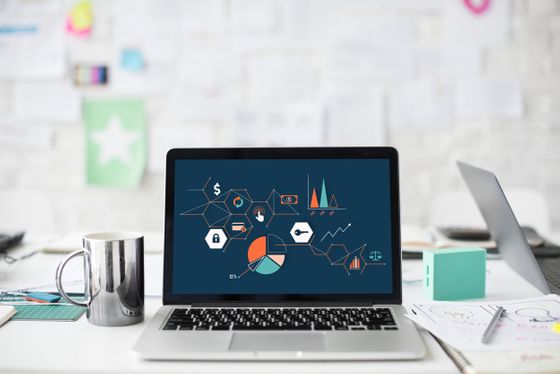What are the 8 important principles you should know about productivity?

by
Productivity gains are attractive to many people, and many people want to increase their productivity, get their work done smoothly, and use their leisure time for their own skills and hobbies. Stever Robbins, who provides business-related coaching and lectures, explains “ eight important principles ” that you should know about such productivity.
The Top 8 Must-Know Principles of Productivity
https://www.quickanddirtytips.com/productivity/time-management/top-principles-of-productivity
◆ 1: Technology is attractive but not a solution
Many people have believed that 'technology advances will improve people's productivity,' but Robbins pointed out that the idea is not necessarily true. Silicon Valley understands that making users 'technology addicts' is profitable and says that they are creating 'not toys'.
Although smartphones have become an indispensable tool for people, increasing social network usage time and nailing them to video playback sites also cause interruptions in interaction and creativity with people . A multitasking tool like a smartphone that enables a lot of work can cause disparate activities like social networking and learning, trading with clients, and can not focus on one thing, Robbins noted. .

◆ 2: Productivity is not personal
When it comes to improving productivity, it's more than just an individual. Certainly it is very attractive to increase your productivity and do a lot of work, but forget that people in your organization are working with others, such as colleagues and business partners in their work It should not be.
In an organization, when a job is finished, another person takes over the work, and the same job is performed by several people in a coordinated manner, and the project may not work well when one of them demonstrates the highest productivity. . In that case, it is important to identify the flow of the entire work, understand where the problem is and solve it. In addition, Robbins says that if the organization itself is rotten even if it exhibits excellent productivity, it may be polluted, and it may be considered to withdraw from the organization at an emergency. Says it should be kept.

◆ 3: Rest is important
Robbins argues that if you are busy with your work and you have no breaks, it's because you're dealing with extra work or doing too much work. In such a case, it is not preferable because there is no time to think slowly and learn for growth. Mr. Robbins leaves his computer and smartphone at rest and scribbles free fancy with paper and pencil, so free fancy seems to enhance the creativity of the brain.

by
◆ 4: Productivity is hard to see
For example, when someone is taking a break in the office, many people tend to think, 'He's doing a job because he has too little work! Give him three times more work!' Actually, there is a possibility that the person has an overwhelming productivity, and it is possible to finish the work quickly, but most people do not consider who is showing how much productivity.
This is a phenomenon that occurs because productivity is less visible. A mechanism that can visualize one's own productivity in order to be considered as “I'll have a very good ability to process work and let's get back to work soon after work is done” by increasing productivity. Robbins says that it should take some time to make

◆ 5: It is important to ask 'Why?'
Humans set goals and strive to achieve them. However, it is said that it is too enthusiastic about using the head to make the task as fast as possible by making it more efficient in order to achieve the goal, and sometimes it moves in a direction that deviates from the original goal.
That's why Robbins argues that it is important to stop the job from time to time and ask, 'Why are you doing this?' You may find that routine tasks such as checking emails, organizing inventory, and creating reports are actually worthless. At such times it is better to stop meaningless work and focus on really valuable work, saying, “It is far better to do something meaningful rather than productively doing meaningless things. “I think,” Robbins thinks.

◆ 6: Think about what should be optimized
Robbins argues that when optimizing business to improve productivity, you should consider 'what to optimize?' For example, if you have devised a system that streamlines e-mail classification, it is important to consider how much your productivity will actually increase in the system and whether there is anything else that needs to be done. .
When it comes to working with computers, what people need to do is make them read screen data and documents quickly or make typing faster. These activities account for 90% of the time spent using the computer, and with only a 10% improvement in typing speed, there is a possibility that the processing speed of computer work will be significantly improved.

◆ 7: Determine if efficiency tools are really useful
There are a lot of tools to improve productivity in the world, but many tools are not developed based on understanding of individual work content. Of course, engineers believe that good tools can improve productivity, but they are developing it, but when using tools, it should be confirmed whether it really leads to improvement in productivity. . Robbins argues that once you find a tool that seems to speed up your work, you should measure how much productivity actually improved.

◆ 8: Technology makes people vulnerable
Today, useful websites and web apps make it possible to improve productivity, but if the site or app itself crashes or the device it manages gets corrupted it is fatal to the business it has It should be kept in mind that it can have an impact.
Robbins, for example, said that when his smartphone broke down, he was completely helpless for two days before getting a new one. The customer was puzzled without being able to contact Robbins and was unable to access the website because he did not receive a login text message. Technology can help a lot in productivity, but it is better to be aware that it's also a double-edged sword, Robbins said.

Related Posts:
in Note, Posted by log1h_ik







